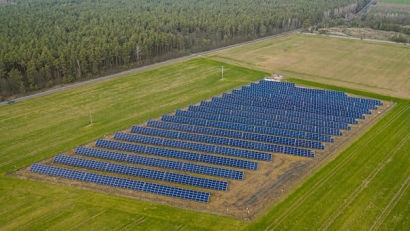
Changing consumer needs and growing demand for solar energy inspired a project called ‘Solar Community’ (‘Saulės bendruomenė’ in Lithuanian). . The project is unique as it gives an opportunity to buy or rent a remote solar panel and do all that using one online platform, thereby helping to meet the world’s need for faster and more efficient ways to generate renewable energy.
The online platform enables consumers to purchase a share of solar energy generated in remote solar farms. New opportunities for residents of apartments appeared as the Lithuanian Ministry of Energy introduced the new law to install solar plants on 1st of October 2019. Residents now can produce and consume electricity for their own use in geographically different places. The buyer calculates how much energy a household uses and then accordingly buys a part of remotely generated power. Capacities range from 1 kW to 10 kW and feed the electricity produced into the grid to cover their household needs later.
“The world is eager to contribute to clean energy generation and switch to solar energy” said Deividas Varabauskas, Managing Partner and Chief Business Development Officer of Sun Investment Group. “But eagerness is not enough - at this point, we have to act quickly and come up with more efficient solutions. The Lithuanian market was suitable to start our project. Recently Lithuania in pursuit of the EU energy plans passed amendments stating that everyone had the right to generate and use renewable energy sources from remote solar power plants. An average Lithuanian household needs a 2-3 kW power solar panel. So within a year of using a 2 kW solar panel, a household would approximately save 190 euros, around 930 trees, and reduce CO2 emission by 37 tons. Of course, the return depends on the panel’s size and whether you rent or buy it, but the results are evident.”
Mr Varabauskas added that platforms like ‘Solar Community’ not only help Lithuania to move towards climate neutrality, but are also a practical way for citizens to save money. Currently, an average Lithuanian household needs a 2-3 kW power solar panel. So within a year of using a 2 kW solar panel, a household would approximately save 190 euros, around 930 trees, and reduce CO2 emission by 37 tons. The return depends on a panel’s size and whether it is rented or purchased, but the results are evident.
‘Solar Community’ is an example of how governments and organisations can include more individual and private consumers to contribute to a clean energy transition. Businesses can also use the new remote model. With these changes, it is expected that the popularity of solar energy will increase encouraging other countries to follow Lithuania’s example.
Household owners and companies can also apply for the financial compensation for buying the remote solar panels. The Lithuanian Energy Ministry has recently released a support scheme which allows consumers to apply for a one-time compensation of 323 EUR per installed kW. This is expected to increase the current number of producing consumers of 3400 by several times.
Although Lithuania is the first country in the world to launch an online platform to buy solar energy, similar efforts are not a new thing in the world. For instance, recently, Audi introduced its subscription-based platform where Audi vehicle users can purchase plans for solar energy. With similar projects in progress, more advanced solutions can be expected for developing solar energy production.
Modern consumer needs require advanced solutions. For a long time, it was believed that solar energy was available only for companies and individuals who owned private property or had a large rooftop to set the structure. But now, with Lithuania taking a leap in remote solar energy production, the market should see more consumers contributing to renewable energy growth.
For additional information:

